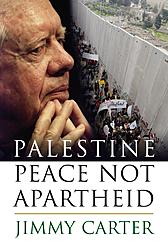books
Books like Palestine: Peace Not Apartheid
Palestine: Peace Not Apartheid
As might have been expected, Israeli and Jewish leaders were apoplectic at Carter for daring to criticize Israel. David Ross, who worked with Carter, had published an Op Ed in the NY Times excoriating Carter for a factual error he had made in identifying a map in the book. Fourteen members of the board of Carter’s foundation resigned in protest. So what is all the fuss about? Jimmy Carter - image from USA TODAYCarter has a fluid, if dry writing style. One reads him for information and analysis, not for literary inspiration. It is difficult to imagine the guy cracking a joke. There will be no whoopee cushions appearing unexpectedly under Roslynn at the dinner table. But Carter is arguably America’s greatest living statesman, a serious, religious fellow who puts his beliefs into practice by attempting to resolve international conflicts. He is a force for good in the world, and stands out when compared with the post White House activities many of the other ex-presidents. Nixon engaged almost exclusively in self-serving memoir writing. Reagan looked for the big payday giving million-dollar-a-pop speeches in Japan. 41 did some fishing and played a little golf before he teamed up with Bubba to do some concrete good. Ford dropped out of sight. I imagine 43 has maintained a low profile, spending his time clearing brush and enjoying holidays with his Saudi friends. Obama has been quiet, but has an activist organization working on important public issues and has been working on a project to help fix our gerrymandered congressional districting. Carter is the ex who has been the most engaged in the world on a global scale. He may be the only American who might have been ever been deemed a candidate for UN Secretary general. While one may agree or disagree with him on the particulars of specific international conflicts, only a maniac would contend that he is not a force for sanity in the world. Carter offers specific information on what was agreed to when, what was said, what was understood re the various dealings between Israel, the Palestinians and the national enemies at Israel’s borders. It is clear from his reportage that Israel does not live up to the innocent victim image it is so fond of presenting to the world. There is a common view that the Palestinians could have had over 90% of what they wanted in their negotiations with Israel if only Arafat had not been such a hard-ass. Carter offers a very detailed explanation for why that view is seriously at odds with reality. He concludes that what Israel has created, in the occupied territories, is a form of apartheid, in which the Palestinians play the role of South Africa’s blacks. It is a compelling case, particularly when Carter points out the actual significance of Israeli roads that not only divide the West Bank, but which engender cushion-space around them that Palestinians may not enter, when he points out that the pattern of Israeli construction is having the effect of chopping the West Bank up into islands of separate space, incapable of being joined into a single political entity, when he points out all the rights the Palestinians, in their own land, are denied. I’d be blowing things up too. This view fits with what I have learned from other sources, both in books and from the journalists with whom I worked briefly a few years back. They told first hand accounts of Israeli soldiers who would taunt the local Palestinian youth and then when these people responded with tossed stones, the Israelis would slaughter them with automatic weapons. It was clear to me then that the perennial victims had taken on the attributes of their tormenters. If anything I believe Carter understates the case for the demise of moral authority in Israel. As in the USA, Israel is a nation that has come under the sway of extreme elements. Not all, or even certainly a majority of Israelis hold with the view of the extremists that all the land of the West Bank is really a part of Israel, but as long as extreme elements hold political power, and as long as they insist, despite UN condemnation and international law, on building more settlements in occupied territory, the problems there will only worsen. And it is clear that Israelis in power have every intention of absorbing large swaths of the West Bank into Israel-proper, in fact if not in law. It is no wonder that a disgusted populace has rallied behind a murderous Hamas.=============================EXTRA STUFFJuly 31, 2018 - NY Times - the article points out the continuation of troubling extremist leadership in Israel. They’re ‘Blood Brothers’ With Israel’s Jews. But Druse Call New Law a Betrayal. It is eminently clear that the problems Jimmy Carter wrote about in 2006, are as relevant and dark today as they were then.September 20, 2018 - NY Times - How Israel Undermined Washington and Stalled the Dream of Palestinian Statehood - by Seth Anziska

Filter by:
Cross-category suggestions
Filter by:
Filter by:
Filter by:
Filter by:
Filter by:
Filter by:
Filter by:
Filter by: